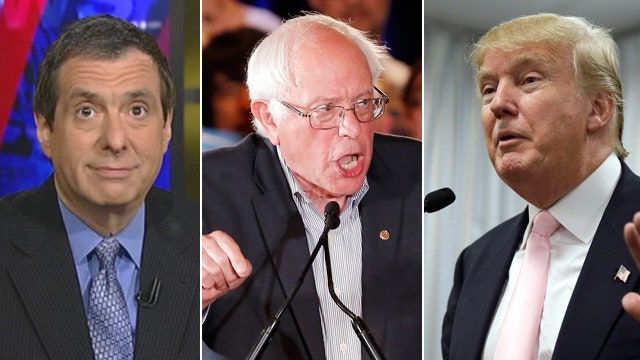Kurtz: Media missing the 'mad as hell' voter
'Media Buzz' host says new 2016 polls are a reflection of Americans' frustration with Congress
America is pretty angry these days, and the media are just waking up to the depth of that emotion.
For many weeks now, political prognosticators have struggled to understand the appeal of Donald Trump on the right and Bernie Sanders on the left. They have tied it to certain micro-factors—Trump’s bombast, Hillary’s weakness—that only scratch the surface of what’s going on.
The mad-as-hell state of American politics is finally starting to penetrate the media bubble, and it is a bubble. Journalists and commentators tend to talk to the same kinds of people—political consultants, donors, other media types—and not so much voters out in the heartland.
But the bubble is not necessarily just liberal in nature. Plenty of conservative media outlets and pundits have ripped Trump as a charlatan and been slow to grasp why he’s connecting with so many Republicans.
And plenty of liberal journalists were quick to dismiss Sanders as a nuisance, firm in the belief that a 73-year-old socialist had no way of slowing the Hillary juggernaut.
When you get out of the Acela corridor, it becomes easier to see why there’s considerable anger and resentment out there. People see a Congress that hasn’t been able to get much of anything done for years and a White House that has all but given up on working with the Hill. They see a political culture that favors posturing over practicality. They see a media culture that thrives on confrontation over consensus.
The Washington Post’s Dan Balz, dean of the Beltway journalists, put it well:
“The discontent is real, whether economic, racial or cultural. It knows no particular ideological boundaries. It currently disrupts both the Republican and Democratic parties. It reflects grievances that long have been bubbling. It reflects, too, the impatience with many political leaders — what they say and how they say it.”
Think about it. Conservatives are angry about illegal immigration, liberals about income inequality, blacks about police misconduct. A new CNN poll captures some of this angst, with 40 percent of those surveyed saying their views are not well represented by the government in Washington. That figure jumps to 53 percent among Republican and GOP-leaning voters, compared to 27 percent of Democrats and Democratic-leaning voters. The disparity probably reflects the fact that Barack Obama is in the White House.
Among the disaffected Republicans, Trump has 24 percent support, trailed by Jeb Bush with 13 percent and everyone else at 8 percent or less.
I don’t think it’s wise to lump Trump and Sanders together, but one thing they have in common is their most passionate supporters believe the system is broken and the game is rigged. They cheer their champions for taking on the powers that be, and while Trump is a classic outsider and Sanders a senator, Bernie isn’t even a registered Democrat.
Sanders rejected the comparison on “Meet the Press,” saying: “The chord we are touching all over this country is that people are profoundly disgusted with the economics that make the richest people richer and everybody else poorer. They are profoundly angered and disturbed by a political system that allows billionaires to buy elections because of this disastrous campaign finance system called Citizens United.”
Trump would be one of those very rich people, as he himself will tell you, but that success is part of his appeal. His approach to the economic doldrums is to say he’d be the greatest jobs president that God ever created, and that America is getting screwed on trade by the likes of Mexico and China. Sanders, for his part, opposed Obama’s Pacific trade deal.
Trump and Clinton aren’t immune from the divisiveness in the country. In an NBC poll of registered Iowa voters, Hillary’s fav/unfav is 37/56 percent, or -19. Trump’s is 32/60, or -28. Sanders is actually +3, or 30/27, but that partially reflects the fact that many voters still don’t have an opinion of him.
The magnitude of the media’s failure here goes well beyond botched horse-race coverage. As initially happened with the rise of the Tea Party in 2009, most of the press has been blindsided by the anger in America. The challenge now is to step up the reporting to understand why so many folks in this country don’t trust their politicians or their pundits.





